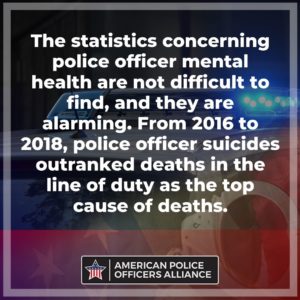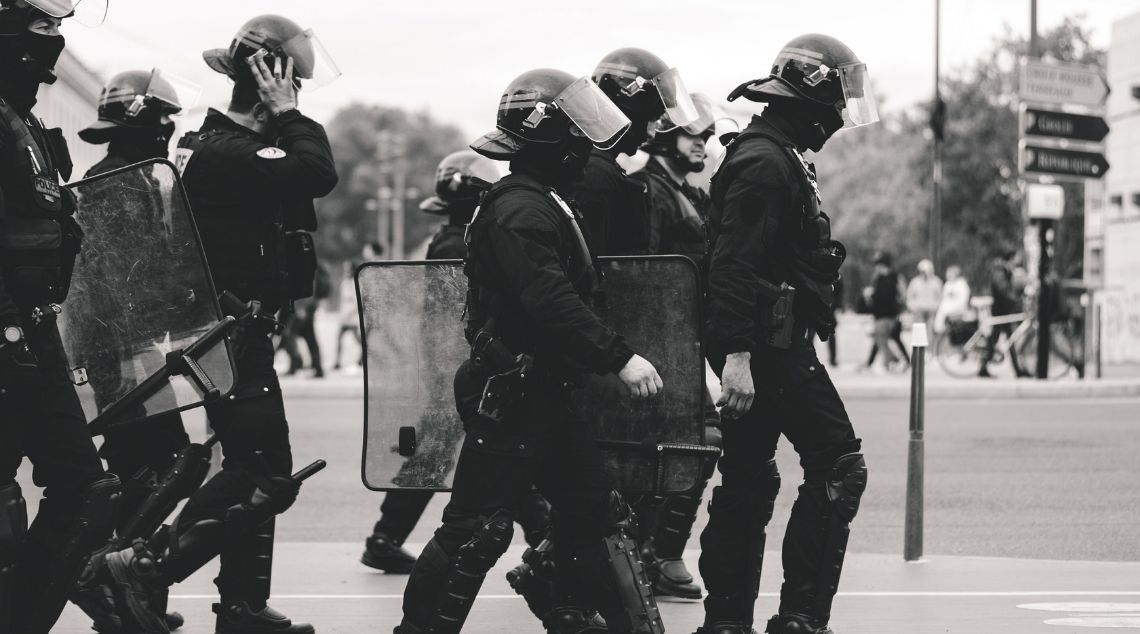In 2019, no fewer than nine police officers working in the New York Police Department committed suicide. This alarming statistic is made more severe when faced with the fact that suicide is a growing epidemic of mental health issues in police officers nationwide — and the problem isn’t getting any better. Hindered by the stigma that still plagues the concept of proper mental healthcare and a lack of proper reporting when an officer is struggling, the risk factor for police officers can no longer be ignored. Not only can poor mental health have a devastating effect on department morale, job performance, and public perception, but it can also destroy the lives of the officers and families affected by suicide. More resources and less stigmatization must be prioritized in order to properly support our nation’s law enforcement.
The statistics concerning the mental health epidemic for police officers are not difficult to find, and they are alarming. From 2016 to 2018, police officer suicides outranked deaths in the line of duty as the top cause of deaths. Nearly 25 percent of police officers will contend with suicidal ideation at some point in their careers, according to the National Alliance on Mental Illness. In addition, smaller police departments, typically under more strain and pressure than their larger counterparts, have reported suicide rates four times the national average.
Suicide is a very real problem in our country, and when the pressures of job performance and public safety are added in — not to mention the daily threat of mortal danger — the threat to our nation’s police officers is real. Additionally, there is still a strong stigma about coming out with mental illness, particularly among men. Statistically speaking, men are far less likely to seek mental health treatment or admit that they are struggling at work or at home. This can lead to devastating consequences borne from internalization of struggle until the distress can no longer be contained. In some cases, the individual may commit suicide. In others, they may harm someone else.

Much of the public eye in recent years has focused on police behavior accountability and transparency of protocol and treatment of minitories. While this is a big priority and a real issue facing law enforcement, much of this pressure can adversely affect the jobs of police officers. At their root, police operations must be founded on a dedication to public safety and a strong mental fortitude and dependability to make decisions under pressure. This is not a recipe for success if someone is struggling with their own mental health; when this occurs, more mistakes are made. Therefore, rather than operating under the assumption that police officers are power-hungry criminals, there must be a more empathetic approach to the heavy job pressure and stressors that accompany the profession. In order to properly enable police officers to conduct their jobs safely, with accountability, and professionally, they must have the proper support and resources.
Without more support of mental healthcare, police morale will fall and more officers will fall victim to depression, suicidal thoughts, and even post-traumatic stress syndrome. When this is a real and dangerous issue, it could also affect the numbers of potential officers enrolling in academies and taking up the service of law enforcement. The potential for both public fallout, major injury or death, and mental illness has a strong potential to deter people from becoming police officers. And when there is a shortage of personnel, morale, safety, and public favor suffers. It’s a cruel cycle, and it is one that absolutely must be broken.
Fixing the Mental Health Epidemic Impacting Police
How can this best be addressed? There are several areas of improvement that must be made a bigger focus, particularly with the approach of the 2020 elections. Supporting elected officials who also support law enforcement and the mental healthcare its personnel needs is of utmost importance this year, as the future and safety of our police officers depends on this.
Better access to mental healthcare
It is imperative that police officers have the ability to seek help as soon as they need it. There should not be delays when seeking mental healthcare, nor should there be a rigorous approval process to allow officers to seek treatment.
Removing the mental health stigma
The battle against mental health stigmatization rages on, and it will continue to be an uphill fight. However, the pressure must be kept on to modernize our society’s way of thinking and help people understand the importance of proper mental healthcare and its potentially devastating consequences if left untreated.
Strong support with financial resources
Police departments must be properly funded and staffed in order to adequately perform their jobs. A police department that has had funding reduced or has not been able to convince voters to approve a tax levy to allow for more hiring is at a much higher risk for mental health issues, among many other potential problems.
Supporting law enforcement and providing the necessary resources for officers to safely and capably do their jobs should be a top priority for our citizens. While the fact remains that officers must hold themselves to a high standard of conduct, accountability, and transparency, much of what the public sees or reads about does not factor in the true mental health epidemic and crisis that is facing these officers. When the bigger picture is looked at, many glaring issues at the root of many police operations can be identified as contributing factors to the end result of a poor outcome, an injury or death on the job, or a suicide. Addressing these foundational problems will work from the bottom up, establishing a stronger ground for law enforcement to stand on and enabling them to provide the best support and care for officers.
Mental health continues to be a huge focus for many parts of the country, even outside of law enforcement. The fact remains that until more progress is made with removing the mental health stigma, we will continue to see rising suicide rates and increased numbers of depression and PTSD diagnoses. Only with a continuous dedicated effort will we see a marked improvement.
Image Credit: Photo by Ev on Unsplash
It’s surprising to learn that 1 in 4 police officers has considered committing suicide. Did you know that more officers die from suicide each year than in the line of duty? Read the full report here.










